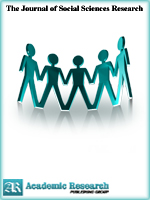The Journal of Social Sciences Research
Online ISSN: 2411-9458
Print ISSN: 2413-6670
Print ISSN: 2413-6670
Quarterly Published (4 Issues Per Year)

Archives
Volume 1 Number 5 September 2015
Poor Communication and Faulty Cognition on Marital Stability of Married Adults in Nigeria
Authors: Mary O. Esere ; BettyRuth Iruloh ; Patricia O. Ojiah ; Roseline O. Bukoye ; Dorothy N. Chieke
Pages: 58-65
Abstract
The purpose of this study is to investigate the influence of poor communication and faulty cognition on marital stability as expressed by married adults in Owerri metropolis. Six hundred questionnaire forms were randomly distributed among the married adults in Owerri metropolis. Ten null hypotheses were developed and tested by the use of t-test and Analysis of Variance (ANOVA).The major findings showed that both poor communication and faulty cognition were responsible for marital instability. The findings equally showed that there were significant differences in respondents’ reports based on gender, age, religion, occupational status, educational background. Based on these findings, recommendations were made. Sex, marital and family counselling should be made compulsory aspect of counsellor education programme as a way of fortifying would be counsellors adequately for their assignment. Married couples should be encouraged in the art of effective communication at home and at work.
Career Orientation for the New Generation of Turkish Human Resource
Authors: Tayfun Arar ; Ihsan Yuksel
Pages: 47-57
Abstract
In today’s world, to survive, people need to
work for a job which they are happy and satisfied. Before choosing their own
job, they need to set a career path. When looking at the history about how it
has been working for people, we see some factors affecting their orientation to
their careers. The world is changing; so is the generation. This paper contains
a research study about the career orientation for this new generation in
Turkey. This empirical study is conducted with an AHP method with Turkish
university students’ career orientation, having as main objective to identify
the factors which are affecting the new generation about the setting their
career orientation and order them in a hierarchical way. The results showed
that this new generation is somehow different from the previous ones,
especially when it comes to career orientation; some factors affect their way
to choose a career path.



